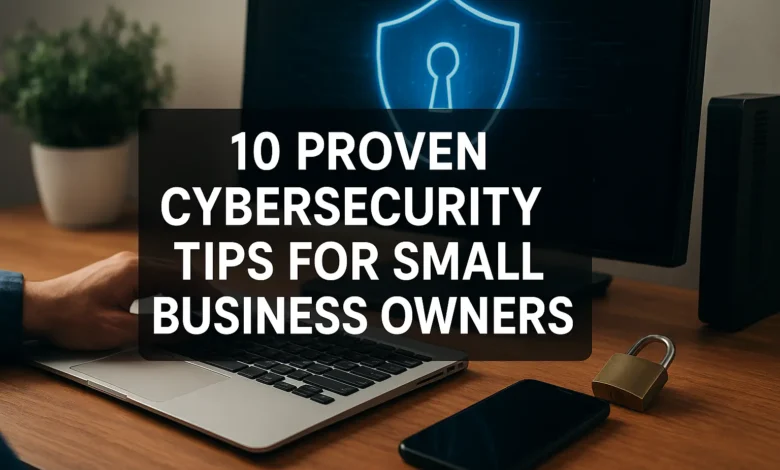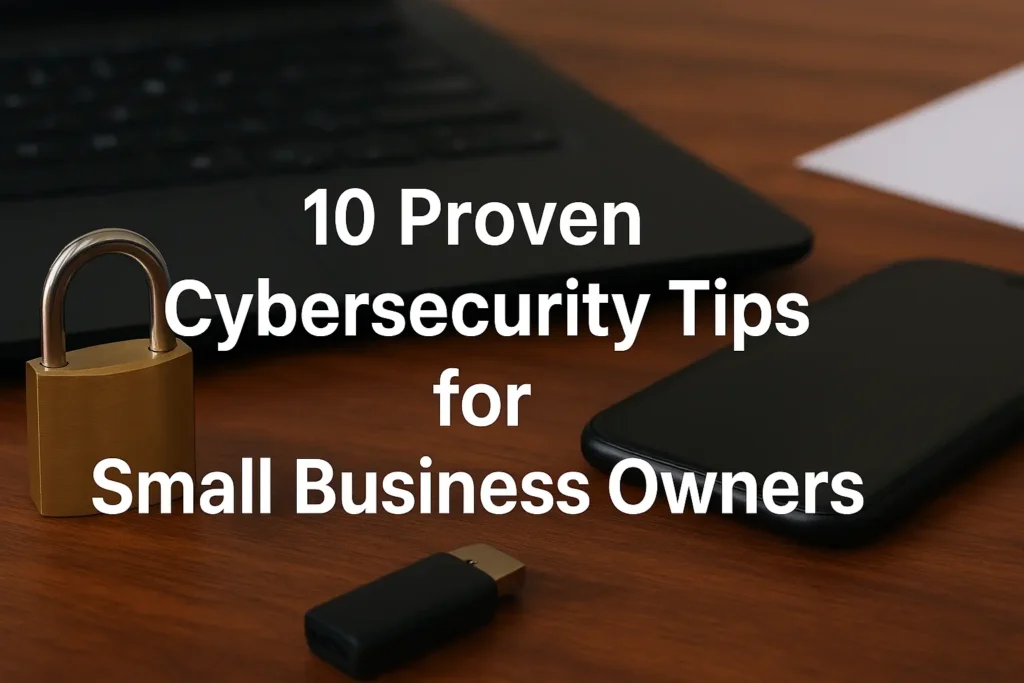10 Proven Cybersecurity Tips for Small Business Owners

Cybersecurity tips for small business owners have become a necessity rather than an option in today’s connected world. With digital tools and online transactions shaping how small businesses operate, cyber threats are growing in both number and sophistication. Hackers often target small companies because they see them as easy entry points. This article explores the most important cybersecurity tips for small business owners, highlighting the strategies, habits, and technologies that can safeguard sensitive information and keep operations secure.
1. Understanding Cybersecurity Tips for Small Business Owners
Before applying any protective measures, business owners must first understand the digital threats they face. Cybersecurity tips for small business owners start with awareness—recognizing risks such as phishing, ransomware, and social engineering attacks. These can compromise data, harm reputation, and lead to financial losses.
Key Points:
- Phishing emails often imitate trusted sources to steal credentials.
- Ransomware can lock critical files until a payment is made.
- Weak network settings allow attackers easy access to private systems.
Summary:
A clear understanding of risks forms the foundation of effective cybersecurity tips for small business owners.2. Why Cybersecurity Tips for Small Business Owners Matter
Cyberattacks can happen to anyone, regardless of business size. Many entrepreneurs underestimate their vulnerability, assuming only big corporations are at risk. In reality, cybersecurity tips for small business owners matter because small firms often have valuable customer and financial data but limited protection. A single breach can disrupt operations, erode client trust, and create legal complications.
Key Points:
- Data breaches can cost thousands in recovery and lost revenue.
- Protecting customer data maintains credibility and trust.
- Cybersecurity compliance helps avoid regulatory penalties.
Summary:
Taking proactive steps through cybersecurity tips for small business owners ensures resilience and reliability.3. Building a Strong Defense with Cybersecurity Tips for Small Business Owners
A layered defense strategy is one of the best cybersecurity tips for small business owners. This involves combining multiple security measures so that if one fails, others remain effective. Firewalls, antivirus programs, and intrusion detection systems should work together to block threats before they cause harm.
Key Points:
- Firewalls filter incoming traffic and block suspicious requests.
- Antivirus software detects and removes malware early.
- Intrusion detection tools monitor unusual system activity.
Summary:
A strong, multi-layered defense remains one of the core cybersecurity tips for small business owners seeking reliable protection.4. Employee Awareness and Cybersecurity Tips for Small Business Owners
Many data breaches begin with simple human mistakes that could have been avoided through awareness and training. Training staff to follow cybersecurity tips for small business owners can drastically reduce risk. Employees should learn how to identify malicious emails, use secure passwords, and avoid sharing confidential information carelessly. Continuous training builds a culture of digital responsibility.
Key Points:
- Schedule regular security awareness workshops.
- Teach employees how to recognize phishing and social engineering.
- Encourage reporting of suspicious messages or activities.
Summary:
Educating your team in cybersecurity tips for small business owners turns employees into your first line of defense.5. Software Updates and Cybersecurity Tips for Small Business Owners
Outdated software often contains vulnerabilities that hackers exploit. Keeping all systems and applications current is a vital part of cybersecurity tips for small business owners. Regular updates ensure your devices have the latest security patches and performance improvements.
Key Points:
- Enable automatic updates for operating systems and programs.
- Replace unsupported legacy software immediately.
- Update plugins, browsers, and apps across all devices.
Summary:
Regular software updates represent one of the simplest yet most effective cybersecurity tips for small business owners.6. Password Management and Cybersecurity Tips for Small Business Owners
Weak passwords are among the easiest ways for hackers to infiltrate accounts. Effective cybersecurity tips for small business owners include creating complex, unique passwords and changing them regularly. Use password managers to store and generate secure credentials safely.
Key Points:
- Use at least 12-character passwords with numbers and symbols.
- Avoid reusing passwords across different accounts.
- Implement multi-factor authentication (MFA) for critical systems.
Summary:
Strong password policies and MFA are indispensable cybersecurity tips for small business owners to prevent unauthorized access.
7. Network Protection and Cybersecurity Tips for Small Business Owners
Your business network connects everything—from employee devices to cloud servers. Cybersecurity tips for small business owners emphasize securing these connections. Protect Wi-Fi with strong encryption, hide your SSID, and monitor devices accessing the network.
Key Points:
- Use WPA3 encryption for maximum wireless security.
- Protect your main business system by isolating IoT devices and guest users on a distinct network.
- Regularly audit network access logs for unusual behavior.
Summary:
Consistent network monitoring and secure Wi-Fi are key cybersecurity tips for small business owners to maintain safe connectivity.8. Safeguarding Customer Data with Cybersecurity Tips for Small Business Owners
Protecting customer information is both an ethical and legal responsibility. Following cybersecurity tips for small business owners means encrypting sensitive data, using secure storage solutions, and restricting access to authorized users only. Compliance with data protection laws enhances reputation and customer loyalty.
Key Points:
- Encrypt sensitive files during transfer and storage.
- Use secure, compliant cloud platforms for data hosting.
- Limit employee access based on job roles.
Summary:
Effective data protection practices are central to cybersecurity tips for small business owners seeking long-term customer trust.9. Backup Plans and Cybersecurity Tips for Small Business Owners
Data loss can result from hardware failure, human error, or malicious attacks. Reliable backup strategies are crucial cybersecurity tips for small business owners. Regularly saving copies of essential data ensures business continuity even after unexpected incidents.
Key Points:
- Schedule automated daily or weekly backups.
- Store backups in secure cloud systems and external drives.
- Test recovery processes to confirm data can be restored quickly.
Summary:
Backup and recovery systems are essential cybersecurity tips for small business owners that keep operations running smoothly.10. Professional Support and Cybersecurity Tips for Small Business Owners
Managing cybersecurity alone can be challenging for small business owners. Partnering with experts ensures your systems stay protected around the clock. Cybersecurity tips for small business owners include hiring IT professionals or outsourcing to managed security service providers (MSSPs) for advanced protection.
Key Points:
- Cyber experts can assess vulnerabilities and patch them promptly.
- Outsourced services provide continuous monitoring and response.
- Periodic security audits keep your systems up to date.
Summary:
Professional support strengthens your overall cybersecurity tips for small business owners strategy and reduces long-term risks.Conclusion: Cybersecurity Tips for Small Business Owners
In an age where cyber threats evolve daily, cybersecurity tips for small business owners play a vital role in survival and success. By understanding risks, training employees, updating systems, and securing data, small businesses can create a resilient digital foundation. Implementing these practices not only prevents costly breaches but also builds trust among customers and partners.
Ultimately, embracing these cybersecurity tips for small business owners empowers every entrepreneur to grow confidently in a secure, connected world.
FAQ: Cybersecurity Tips for Small Business Owners
-
What are the most effective cybersecurity tips for small business owners?
Implementing strong passwords, regular software updates, employee training, and network security are key cybersecurity tips for small business owners. Protecting customer data and using backup strategies can prevent costly data breaches and strengthen overall business security.
-
How can small business owners protect against ransomware attacks?
One of the critical cybersecurity tips for small business owners is to maintain secure backups, enable antivirus protection, and train employees on suspicious emails. Following ransomware protection measures ensures business continuity and reduces the risk of losing sensitive data.
-
Why is employee training important in cybersecurity for small businesses?
Employees are often the first line of defense. Incorporating cybersecurity tips for small business owners into regular training helps staff recognize phishing attempts and unsafe online behaviors. This approach enhances network security for SMEs and minimizes human error risks.
-
What role does professional support play in small business cybersecurity?
Hiring IT experts or consulting cybersecurity professionals is among the most reliable cybersecurity tips for small business owners. Professionals can implement advanced business data breach prevention techniques, monitor systems, and ensure continuous protection against evolving cyber threats.


